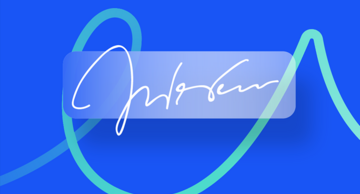6 telltale signs it’s time to switch eSignature providers

eSignatures help organizations remain competitive and keep business moving. Since being legally recognized by landmark laws such as the ESIGN Act in the US and eIDAS in the EU, organizations of all sizes have realized the benefits that an eSignature platform has to offer. Improvements in efficiency and productivity, cost reductions related to paper-based processes, and meeting customer expectations are some of the drivers that have propelled eSignatures to be one of the fastest-growing markets in the world.
Over time, the eSignature market has matured and many new vendors have entered the space. As you assess your current and future electronic signature needs, take stock of your technology investments and ask questions like:
- Are there overlapping and redundant solutions in use across my organization?
- Are we paying above-market rates for our eSignature solution?
- Does our current solution meet our eSignature adoption targets?
- Can our current eSignature implementation scale for the future growth of our business (i.e., across channels and geographies)?
In this blog, we will help you answer these questions by reviewing the telltale signs when it may be time to look for an eSignature alternative.
1. You’re being overcharged for your eSignature implementation
Cross-selling and upselling has its place in a vendor-customer relationship, especially when it comes to new features and services that will improve eSignature processes. But, there’s a fine line between adding value and squeezing more money out of a long-time customer. The relationship you have with your eSignature vendor should never feel exploitative. It should be a mutually beneficial partnership. Many organizations may not realize they are overcharged. We recommend that organizations conduct their due diligence during the contract renewal period to ensure the agreement meets the needs of both parties.
If your provider is charging extra for standard features and functionality, an exorbitant amount per transaction/envelope, or if you’ve experienced a dramatic price hike with unexplained fees and charges at contract renewal time, it may be time to weigh your options and consider switching to a new eSignature provider that provides fair pricing.
2. Your vendor provides little to no support
Reliable customer support is essential to ensure your eSignature solution continues to function. A lot of vendors promise exceptional customer experience, but many fail to deliver. Whether receiving incompetent support, poor service quality, enduring long response times, or just an overall poor customer experience – working with a vendor with poor customer support ultimately impacts your own customer experience.
Let’s explore several reasons why your electronic signature platform may not be making the grade in the customer support department.
- Scaling too fast or attempting to serve a broad market. How much does your electronic signature provider understand about your business or industry? There may be some processes that are similar across one industry that can be covered by one electronic signature platform. If the company tries to cover too many industries at once without trying to deeply understand any of them, it may be difficult to get competent customer support.
- Misalignment in customer support model and your broader business objectives. To deliver quality customer support, the vendor's team must have an understanding of your industry and how your business operates. This helps establish a shared vision of what the businesses will need in the next 1 to 5 years. Before changing eSignature providers, ask if they have the capacity to help you assess and align their customer support model with your broader business objectives.
- Lack of global support and services. As the world becomes more interconnected via technology, it’s important that eSignature customer support is able to provide services in more than just one state or country. This may mean that contracts need to be translated into other languages. Customer support personnel may be needed to speak to clients in other time zones. Having access to responsive support that feels easy and without friction makes a huge difference to an organization that is growing.
Periodically, we recommend surveying the internal users of the solution at your organization. Ask them to rate the level of service they are receiving and whether they feel the solution provider is responsive to their needs. This will provide a clearer picture of the support services provided by your vendor and a better sense of your team's opinions on the solution.
Your company deserves to be heard, respected, and valued. An eSignature is more than just a signature. It’s a signal that business is allowed to proceed. Any backtracks in the customer support arena can result in loss of business and a hit to your company’s level of professionalism.
If your current vendor is not providing the customer support you need, it’s time to explore new vendors that will contribute to the success of your eSignature solution. Choose an eSignature platform that understands your line of business and has the capacity to provide the level of customer support needed as you grow.
3. Your electronic signature solution is not flexible enough to accommodate changing needs
Whether a small business or enterprise, many organizations when first implementing electronic signature software choose a smaller vendor to meet the organization’s immediate business needs. Some, for example, simply want to sign documents with eSignatures in one department to understand the value and ROI before extending it to other departments. Alternatively, they may create an online channel to leverage eSignature tools before expanding their paperless process to mobile devices.
As organizations grow with more employees, new departments, lines of business, service channels, workflows, and geographical locations, your document signing requirements will change - as will the business challenges you need your eSignature solution to solve. For many organizations, their eSignature solutions have become a critical technology to conduct business with internal stakeholders, vendors, partners, and customers.
Your legacy eSignature solution may not have the technical capacity to grow as your digital document workflows and business needs expand. Not only may you need to increase the number of users and signatures, but your organization may be looking to consolidate eSignature capabilities as a result of a move to a shared service model, like in the healthcare or insurance industries.
These organizations may have anticipated switching to a leading electronic signature vendor, such as OneSpan, DocuSign, or Adobe, sometime in the future, but it can be difficult to know when that moment has arrived.
Here are a few questions to ask regarding the technical capacity of your next eSignature solution provider:
- Does the vendor support a broad range of use cases?
- Does the solution include automation, such as reusable templates or bulk send, functionality to streamline processes?
- Can the provider scale across B2C, B2B, and B2E use cases at once?
- Does the vendor support an enterprise shared-services model?
- Can the provider support the agreement process upstream and downstream of signing?
- Agreement generation
- Smart digital forms or integrations with systems of record (e.g., CRM, HRIS)
- ID verification and two-factor authentication or multifactor authentication
- Virtually mediated agreements including remote online notarization (RON)
- Integration with enterprise systems of record (e.g., ECM, eVault solutions)
Your eSignature solution not only has to fit how you do business now, but it also has to have the ability to expand with your business plan into the future. If your current eSignature vendor can’t scale to support new use cases, you’ve outgrown your current eSignature solution. Find a vendor that offers a scalable enterprise-grade solution that can support future eSignature use cases across your organization and beyond.
4. You have poor customer adoption and completion rates
A proven strategy to fostering trust in the eSigning process is to deliver a consistent branding experience at all touchpoints throughout your customer-facing channels. Most eSignature vendors only offer custom branding options like adding a logo or matching the colors to your corporate branding. White-labeling takes branding a step further. It enables you to customize every aspect of the signing process including removing all traces of the vendor’s branding from the signing ceremony. By doing so, your customers can feel confident they are engaging with the right organization. It ties your credibility as a brand to the credibility of the eSignature process, thereby increasing customer trust, adoption, and completion rates.
5. You have concerns about the document security your eSignature solution provides
The document management security of your eSignature solution is critical when dealing with legal documents. In addition to the authentication of signers, your eSignature solution should be using digital signature technology as an encryption method to tamper-seal PDF documents and signatures. This prevents unauthorized changes from invalidating the documents.
Some eSignature service solutions only tamper-seal the document at the end of the signing process, which can put your organization at risk. As a best practice in maintaining the integrity of signed documents, tamper-sealing should occur after each signature is applied in case tampering occurs when the document is in transit between signers. Consider switching to an eSignature provider that has robust anti-tampering controls built into the signed document along with a mechanism to easily verify the integrity of the document, such as an audit trail.
At OneSpan, security is built into our DNA. We are the digital agreements company and partner of choice for some of the most security-conscious and regulated organizations in the world. We offer a wide range of authentication options to ensure only the appropriate signers access the document.
6. Your current provider has made it difficult to migrate, locking you in
Legacy systems and vendor lock-in is a hot button issue for many organizations who are looking to increase their business capacity over the next few years. As companies look to expand the digitization of their services, it’s important that their eSignature platform be able to work with them. However, what some organizations are finding is that they are not able to increase their eSignature capacity or even explore other providers due to outdated contract obligations.
As you start to define your electronic signature solution needs, be sure to communicate the following points:
- Flexibility of use is paramount. Move forward with vendors who understand that your business changes with technology.
- Choose a vendor who adds value to your organization. Rather than make the focus of your eSignature platform about locking you into an agreement, be sure that the provider adds value to the future of your organization.
These last points are sure to support your business growth as you move forward in finding an eSignature solution.
Get ready to switch your eSignature provider
Electronic signatures and eSignature software are long past the point of being a novelty. A secure, reliable electronic signature solution is key to success in the new normal. If you have doubts about your current eSignature solution, then it’s time to evaluate other eSignature software vendors in the market.
If your organization has outgrown other electronic signature providers, such as Docusign, Adobe Sign, HelloSign, PandaDoc, EverSign, SignNow, SignEasy, or another solution provider, let us help you discover an electronic signature platform with the functionality to grow with your business vision.
Ready to make the switch? Contact our team to learn how OneSpan can deliver a secure, trustworthy, and scalable eSignature solution for your organization.









